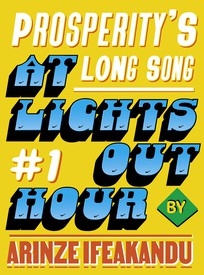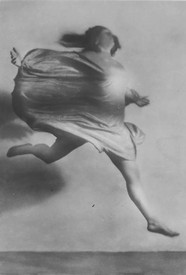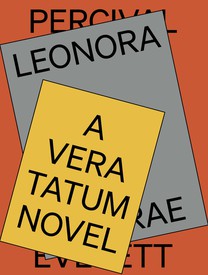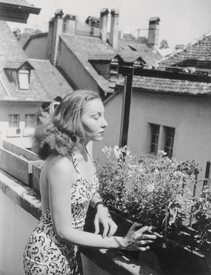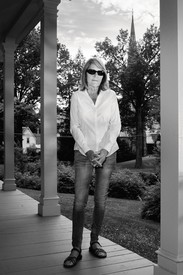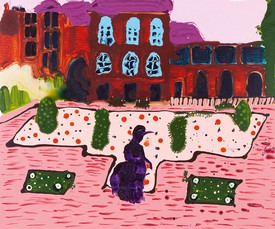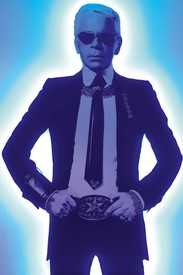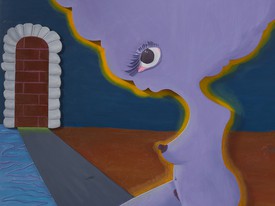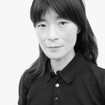
Anne-Laure Zevi is French and lives in Switzerland. Her short stories have appeared in translation in The Paris Review, The Brooklyn Rail, and The Hopkins Review. An exhibition of her drawings was held earlier this year at 107 s-chanf, in S-chanf, Switzerland.
With the same modesty that made her put a hand to her décolletage when Eli Mosserri’s eyes landed on her, Jeanne Dumonet turned her face away when the man who was looking at her smiled at her. She nevertheless resolved to sit by him as the seating plan instructed. He knew how to put her at ease, and the bell that sounded at the end of intermission interrupted them in animated conversation. Eli Mosserri said then to Jeanne, “You can take pride in having dined with a man who was seated next to the great Irène Orlov, to whom he did not address one word because he was too busy talking to you.” Jeanne blushed, and Eli Mosserri apologized for causing her embarrassment. Despite the bell that exhorted the audience to return to their seats, many guests came up to greet Eli Mosserri, walking against the flow of the crowd that was carrying Jeanne off.
Once Jeanne was back in her seat, she sat still and kept her eyes riveted on the stage: you would have thought she was truly captivated by the performance. Opera hardly interested her at all, and she found La Bohème especially dull, but the second half of the production seemed less tedious to her than the first. Irène Orlov’s voice was seductive even if the story was insipid and the music melodramatic; at the same time, as an actress, the soprano leaned so much on her sensuality that Mimi’s hesitations seemed more like feigned prudishness than charming reticence.
Eli Mosserri and Jeanne Dumonet next saw each other at a dinner party to which she had accompanied the husband of a friend. Eli Mosserri greeted her a little solemnly, and during the hour that preceded the dinner, he did not pay her the attention that he had the first time. Once at the table, they were seated across from each other, and more than once, Jeanne felt Eli Mosserri’s glance lingering on her insistently. She wished she hadn’t worn her black flannel dress, which contrasted so starkly with her coloring. Jeanne’s skin—her face, her neck, her hands—was white; not the white of the absence of color but the luminous, intense, secret white of the nape of the neck, which is sometimes hidden, sometimes revealed, by the collar of a silk kimono; or the striking velvet whiteness of white flowers. Her red-blond hair was the only element of artifice in her appearance. Their third meeting was not by chance. When Eli Mosserri asked to speak to Jeanne Dumonet on the telephone, Jeanne had no trouble identifying the voice of the man who was calling. Her own, however, perched in an unduly high register throughout their conversation, which culminated in an invitation from Eli Mosserri to lunch.
Once they had ordered, Eli Mosserri, without preliminaries, said, “For nearly a decade, I’ve been involved with a person who is married. The times we spend together have always been stolen moments—too few of them—complicated last-minute rendez-vous, which are sometimes canceled at the last minute, in hotels unconducive to romance, in cities that are often foreign to both of us. Our relationship is restricted on one side by this person’s work schedule and domestic life, and on the other by the fact that I cannot stay on French soil as long as I would like. To restore some spontaneity to this relationship, and a little of the lightness of its beginnings, I would need to have French nationality; and that is the reason that I called you today. I beg you to excuse the impertinence of my request: I would like to know if you would be willing to marry me. This would, of course, be a marriage of convenience.” Jeanne was bewildered, but since she showed no sign of being shocked or offended by the proposition, he continued to make his case. Respectfully, but without flattery, without currying favor. He did not hide from her the fact that if she agreed to help him they would have to move in together until he had obtained his passport; and lastly, he suggested that they spend time together so she could get to know him. He seemed to have anticipated all the questions that a contract of this nature might raise, and Jeanne felt no need to ask any questions.
The next day, Jeanne Dumonet declined Eli Mosserri’s invitation to go to a concert. He did not insist, but he called her two days later, the day after that, and all the days that followed. He always called at the same time, at the end of the morning, and he did most of the talking. He spoke of what he’d been doing, what he’d written about the concert or the opera that he’d attended the night before in Paris or in some provincial city; he recommended exhibitions or films, he told her who he’d had dinner with and what he had talked about with his guest. Once he had Jeanne’s attention, Eli Mosserri would try to make her talk about herself, and would ask her about her work as a translator—he spoke four languages fluently, had read a lot, and his curiosity was unfeigned. When Jeanne started speaking, their sentences would bump into each other, their voices would overlap, each would break off to let the other talk, and then they would cut each other off all over again. Jeanne blamed herself for being so awkward. Gradually, in the course of the conversations, she learned to assert herself, to make herself heard, and to endure the lulls. For the time being, Jeanne seemed to be satisfied with these distanced encounters. Shielded from the confusion that physical proximity to Eli Mosserri caused her, she was able to let the best side of herself come through. One day Jeanne waited the entire afternoon for this daily call, which she by now had come to expect. When it came at last, she accepted Eli’s invitation to accompany him to an art opening. The next day they met for drinks, then went to dinner. Their tête-à-têtes were no longer limited to their telephone conversations. But even on days when they had agreed to see each other, Eli Mosserri would always call, even if only briefly. The natural and lively character of their outings almost made it possible to forget the purpose of the time they spent together. The question of the answer she would give never came up. Eli Mosserri hoped to rally Jeanne to his cause, to earn her esteem without attempting to seduce her entirely. If he sometimes made her blush, it was not on purpose—it had more to do with the fact that not so much earlier, Jeanne had hardly dared to meet this man’s gaze.
Unexpectedly, Eli Mosserri announced that he would be going away. He did not say where he was going, who he was going with, or when he would return. Nothing required him to do so; not only were he and Jeanne not a couple, but if their union were to come to be, it would be to ease the running of his private life, not to hobble it. Jeanne could demand no explanation, yet now she would have liked to ask him questions that she had thought she could dispense with at the time of his marriage proposal. Did it appear that there was no one in her life? She gave off no air of loneliness or desperation, and exhibited none of the flaws associated with old maids: she was neither old, nor ugly, nor peevish, nor bitter; she did not seek inordinate affection from her friends, or lavish it outrageously on other people’s children, the way people sometimes do who long for children of their own. She had her own money, and she was not always free when she was invited out, for the very good reason that she was in great demand. Certainly her ethereal smile, her vestal bearing, could sometimes elicit coldness from women and abruptness from certain men, but her conversation and sense of humor were widely appreciated. Did those qualities make her the ideal candidate for a marriage of convenience? Who else, apart from her, was aware of Eli Mosserri’s love life, or of the proposition he had made her? Was it possible that she was the only one who did not know the identity of the person for whom he was prepared to commit an illegal act?
She felt all the more vulnerable because she was still gripped by melancholy after a dinner the previous evening at which a man had declared as he saw her pass, “What whiteness, what splendor!” and she had felt herself shrink. Compliments like that, made aloud so that everyone can hear them, particularly the person they’re directed at, have something condescending, even menacing about them. Although Eli Mosserri had been at her side moments before, he had evaporated, and she had found herself stranded amid a clique of gossiping, fashionable women who had glared at her disagreeably. None of them had taken the trouble to speak to her, and Jeanne had remained in a state of distress, the designated victim of their whispering and bursts of laughter, as if she were back in the jungle of her high school courtyard. In middle school, the whiteness of her skin had never been a subject of mockery among her schoolmates, who were far too busy teasing her about her weight, until the day when a new professor had exclaimed, upon seeing her enter the classroom, “Let there be light!” From then on, the students had tried out this new theme themselves, and their imagination proved inexhaustible: “Oh my God, enlighten me!” “Jesus said: “Do not hide your light under a bushel.” Or again, when the adolescent girl stood on the ladder of the swimming pool, fat and luminous, someone would shout: “And God invented the light bulb.” When they read Moby Dick, she had expected a barrage of new barbs, but in the event, none came. The silence of her schoolmates was even more humiliating because she herself felt, beyond the terror, the revulsion inspired by the smooth whiteness of the whale’s skin.
In this way Jeanne advanced from middle school to high school, clad in too-big sweatpants and too-long sweaters in bleak shades of mottled gray. To remove herself still farther from her classmates’ gaze, she had ended up not going out with them on weekends. She did not feel she was missing out on anything, except, after several months, she noticed a change in their behavior. On Monday mornings the girls often displayed new clothes or new hairstyles, they smelled good, and some of them wore makeup. It soon became clear that the ambition of these weekly forays went beyond being seen in town, which had been the goal up to then. In short, whether they were girls who had “done it,” who pretended they’d “done it,” or who were still light-years away from “doing it,” their conspiratorial whispers, their flirtations, their long sighs, had one single solitary focus: sex. As a high school student, Jeanne did not suffer as much from the absence of sex in her life, or even from the absence of any immediate prospect of “doing it,” as she did from the way her classmates treated her, the strained silence that fell when she interrupted their hushed conferences, the impersonal smiles they gave her when she bumped into them when they were in the company of a boy, the winks revealing a complicity that had developed around activities and secrets from which the adolescent Jeanne was excluded.
The flight for which Eli Mosserri had not, so to speak, prepared Jeanne took her by surprise, and the agitation that seized her was all the more confusing because it was foreign to her. During those endless days, Jeanne went over in her mind the women he had introduced her to in the past weeks, lingering on the most beautiful among them and trying to remember whether they were married. The ringing of the telephone made her jump—the inopportune caller found his conversation cut short. The big mirror in the bedroom saw her walking back and forth more often than usual. Confined at home, dreading being seen alone when Eli Mosserri was with “another,” she abandoned herself to this new trouble, fueled by questions that had no answers, reproaches that had no basis, those little dramas that keep us from sleeping as we write, rewrite, and replay them in the dark.
When the man she had been waiting to hear from finally called, Jeanne knew for the very first time the relief of the woman who has waited, who has been impatient for someone’s return. That same night they went out for dinner. Jeanne wore a midnight-blue suit. Her beauty, heightened by the traces in her eyes of the debilitating anxiety of the last few days, and by the excitement, still intact, prompted by Eli Mosserri’s return, made a vivid impression on the other guests. Looking at her, you might have thought her indifferent to the silence provoked by her appearance—the admiring looks, the engaging smiles, the compliments murmured as she passed—but in fact the attention she received at that moment overwhelmed her. She accepted an ice-cold martini. The alcohol burned her throat and the heat traveled to her chest; the second mouthful made her stomach glow; the third invaded her entirely. Jeanne let herself surrender to it. The indignation, the resentment, of the recent days seemed laughable in the exhilaration of reunion; forgotten the pettiness, the inappropriate jealousy; she simply lacked experience, she was not hardened to the little agonies in the life of a couple. None of that mattered now, everything was so simple. As the guests made their way to the dining room, Jeanne pulled Eli Mosserri aside and—although she had never even glimpsed his apartment, the objects he surrounded himself with, or the light under which he read, so it was said, history books and historical novels late into the night; with no idea what the last thing he did before he went to sleep was; never having shared with him the consistent intimacy of waking up together, eyes full of sleep, face puffy, hair in disarray—she murmured into his ear, “The answer is yes.” And without concerning herself with the effect produced by her unexpected declaration, she went to take her seat at the table. That night, if a glowing halo had been set above Jeanne’s head, it could not have shed a more divine radiance than her face. The night that Jeanne said yes, the future spouses still lived apart, but the next morning they began apartment hunting. On the wedding day, Eli Mosserri came to pick up Jeanne Dumonet at her home, because she had wanted to spend that last night at her own place. Jeanne wore a shimmering dress with a fitted, elegant jacket. Eli Mosserri presented her with a bouquet of gardenias, heady with fragrance.
The next morning, husband and wife awoke in an apartment that belonged to neither of them and that smelled of newness; they went out for breakfast. Like someone who wakes up next to a stranger the day after a drinking spree, Jeanne Mosserri, wrapped up in her newspaper, struggled to explain to herself the presence of her “husband” at her side, but her unease dissipated during the walk they took afterward through the streets of Paris. Every object Eli Mosserri looked at, every book he leafed through, every street he chose, was a source of wonder, and the day that they spent strolling together was much more remarkable than her wedding day, of which the image she retained was confused—she regretted in particular that she could not remember the exact moment when he had taken her hand and put the ring on her finger.
As time passed, the young married couple discovered that they shared the habit of waking at dawn and stumbling to the kitchen in search of breakfast, which they then would carry back to their respective bedrooms. Each of them, without the other’s knowing, would often fall back to sleep while reading or listening to the radio. Once dressed, Jeanne would install herself at the living room table; brighter and less cluttered, this new setting for her work pleased her. The opera and its lyrical flights, the windows, open and closed, the distinct squeak of a certain section of parquet in the adjoining room, all the sounds that came to her from the bedroom occupied by her husband, became agreeably familiar to her. He would appear at the end of the morning, at the time when he was formerly in the habit of calling her, and together they would have their second coffee of the day.
One morning, Jeanne Mosserri found the following message on her work table: “Went out at dawn. Sorry for not having seen you before I left. Will be back in time for the concert.” For all that he had become a husband, Eli Mosserri did not say where he was going and left no telephone number to call in case of emergency. Jeanne forced herself to chase away every thought connected to this episode, which she was not reasonably entitled to resent. Late in the night, as she was getting ready for bed, Jeanne heard the sound of a key in the lock. She rushed into the entry hall, where she found Eli Mosserri with a travel bag in his hand; he headed toward his bedroom without a word. Not knowing what to do, Jeanne went to sit in the living room, where he eventually joined her, a cigarette and a glass of vodka in his hand. Jeanne had smelled the scent of tobacco on his clothes before, but she had never before seen him smoke. In silence, Eli Mosserri surveyed the apartment, whose aesthetic reflected a shared taste for great comfort combined with a certain sparseness, and whose decoration had occasioned unexpected moments of bonding. As if only then becoming aware of Jeanne’s presence, he excused himself for intruding at such an hour, and assured her that once his passport was secured, he would return to live at his place and would not bother her any longer. Then he said, “The person I’ve told you about has decided to end our relationship on the pretext of concern for family, wanting to protect the fragile happiness of the children, wanting to be free of the deception, the guilt, that our love has supposedly already suffered too much—a tired refrain, given the challenges we overcame and the joys we shared; empty words that show contempt for my sacrifices and my loneliness; loneliness intensified by the uncertainty of my future, but that I nonetheless refuse ever to express.”
Eli Mosserri spoke with an exaltation that Jeanne did not recognize in him, and that she preferred to attribute to alcohol than to genuine distress. “It’s not as if I knew nothing about self-disgust, I who am always essentially on offer,” he added bitterly. Upon which he looked her straight in the eyes and said, “I would have been unable to contemplate marrying any other woman but you.” Jeanne did not blush. She suggested instead that they go to sleep, and went toward him to help him stand up. He took her outstretched hand and brought it to his cheek; when he moved away, Jeanne could feel the exact spot where his face had rested on the back of her hand. She accompanied him to the threshold of his bedroom and wished him a good night, but he begged her to stay a little longer, and gestured to her to sit on the bed. As he got undressed, he kept talking, saying he wanted to take her to the Côte d’Azur in the guise of a honeymoon; he described the hotel where they would stay, the villages he would show her, the restaurants she would love so much. Then he slid under the sheets, closed his eyes, mumbled a few more words, then fell silent. His breathing suggested that he had fallen asleep. His forearm, naked and smooth, carelessly emerged from the rolled-up sleeve of his pajamas. At his wrist, a bracelet of skin lighter than the rest attested to long hours spent in the sun; at the exact position of the face of his watch, the skin shone. That hand that was so graceful when it toyed with his cigarette, so elegant when it brought the glass to his lips, now seemed somehow out of proportion to his delicate arm: his inert fingers were too long, too narrow, the nails too manicured. Yet when that same hand reassumed its form while adjusting the sheet, Jeanne found it beautiful again.
Jeanne Mosserri woke to the sound of pounding rain. Still heavy with sleep, she remained impassive, listening to the hammering of the water on the window, but when the noise suddenly stopped, she opened her eyes, incredulous. Seeing the bedroom that was not hers, she immediately closed them again—she did not have to look under the covers to know that her nightgown and robe were in place. A bright light coming from the bathroom dazzled her face, and then a puff of steam filled with Eli Mosserri’s perfume dispersed across the room. It took him ages to get dressed. After hearing the metallic click at the front door, Jeanne threw the whole length of her body into the scent and warmth of the imprint left by her husband in the mattress and buried her face in the rumpled pillow.
In a beautiful hotel at the edge of the beach, Eli Mosserri had reserved two connecting rooms for himself and his wife, rooms separated by two upholstered doors. Each of them spent the day on their own, and they met up when it was time for drinks before dinner. Eli Mosserri had regained his enthusiasm and his good mood. Nothing really seemed different, apart from the fact that Jeanne kept asking herself about the meaning of this “honeymoon.” From now on, was Eli Mosserri a “free man”? Hadn’t he invited her into his bedroom that night? When, during the flight from Paris, she had woken up with her head on his shoulder, hadn’t he smiled at her more tenderly than he would have before his unfortunate escapade? Jeanne was now tempted to read every look, every compliment, every inflection of his voice, as a sign in her favor. She slept restlessly, woke up early, weary. Her anxiety was heightened by her inability to clearly identify a single sound from her husband’s room on the other side of the wall: neither the noise of the shower, nor the murmur of the radio, nor any indication of anyone entering or leaving the room. She heard the ringing of the telephone many times without ever being able to determine whether it was coming from the room to the left or to the right of hers. She barely dared approach the tall, open French doors for fear that he might be on the neighboring balcony. She missed living together in their Paris apartment. Late in the morning she would call a car, give the driver the name of a village, or just a direction, and let herself be driven along the coastal highway or the winding roads of the back country. Far from the hotel, away from other people’s eyes and from the sun, beneath her broad hat, she walked down random streets, letting herself be overtaken by sensations, previously unknown to her, that her intimacy with Eli Mosserri, tenuous as it was, had awoken without her quite daring to recognize them for what they were.
In college, the general indifference to her heaviness had revived the memory of a conversation in which she had heard her father ask her mother what they should do about her weight, to which her mother had replied, “It takes all kinds of people to make the world, and there’s room for the fat ones too.” At the time, this outrageous response, far from spurring the child to lose weight, had moved her to eat more; whereas in college, the memory of the phrase had inspired the young woman she had become to reject the notion that her appearance was fated. So it was that Jeanne had emerged from her excess poundage, her camouflage uniform, her student rooms, and had discovered in herself, not without surprise, an admirable physique, a beautiful face, and magnificent skin. Because of her new appearance, she found herself being flirted with for the first time, but the metamorphosis she had pursued had not been accompanied by any urge to catch up on the experiences she had been deprived of until then. Whereas the young men who ogled her were cowed by her beauty, older men were drawn to the fragile virtue she projected, which she herself did not suspect—her way of evading glances, of withdrawing her hand, of refastening her shirt when the collar had opened. The young student was both flattered and intimidated by the attention that was focused on her. But whether it was because she was not smitten enough or because her suitors were too eager, she never encouraged them, and as much as she would have liked to prolong the pleasure of being courted, or even to take harmless revenge on the past, Jeanne was in no hurry. She liked being beautiful and she felt pure.
Now, however, it was her turn to wait for a sign and to be impatient. She was consumed by curiosity, yet, at the same time, her vital energies seemed to be abandoning her. She would let herself sink into a lulling torpor that derived from the waiting, and then unexpectedly, revolting against this unfamiliar state of languor, she would walk more quickly, propelled by a sudden spurt of energy, before stopping a few yards later, stupefied. Attempting to contain her torment, to quell the embarrassment arising from the incongruousness of her marriage and honeymoon, she constantly sought to persuade herself that she felt no desire, that she only longed to “do it” in the hope of never having to think about it again, of never again having to avert her eyes from an erotic scene onscreen, of never again blushing when someone ordered a Virgin Mary. She hoped to be able to convince herself that it was her mind that implored her, not her body that compelled her—the body that you would have thought she was trying to call attention to with the dresses and suits she sheathed it in, when on the contrary she was trying to keep it contained, to rein it in; the body that had brought her shame for so long, and that against all expectations had revealed itself to be a source of pride. And so, in the confidence she had so belatedly acquired, Jeanne’s voluptuousness had formed over the years around the single pole of exciting admiration and covetousness. She had come to fear her own sensuality. The pale vestal was flushed with fever.
One day, as she idled on the shady terrace of the hotel after an excursion that had been too hot and dusty, Jeanne heard a woman talking about a splendid calanque, a hidden cove that was difficult to reach but had a secluded beach that was rarely visited; on the basis of which she decided to go out again. The chauffeur dropped her off on a road overlooking the sea. Above and all around her was the sky of a late summer afternoon. She set off with a firm step down a steep path; at the most precarious places there were wooden steps and a makeshift railing. The beach was deserted. She took off her sandals, her dress, and her hat and headed toward the sea. An almost imperceptible breeze ruffled the surface of the water, whose innocuous waves came at regular intervals and covered Jeanne’s ankles; as they withdrew, they carried off with them a little of the sand beneath her feet, and she felt herself tilt forward. She walked into the water; when it came up to her waist, she stopped. Around her the water created a line of demarcation, like a slender belt that held in nothing but divided her body precisely in two, the top part blazing, bridled, conscious of its limits, restrained, and the lower part refreshed, its contours diffuse. She submerged and disappeared. A few yards away, a beam of light pierced the surface before breaking into a graceful breaststroke; Jeanne swam a crawl, a backstroke crawl, dove under again, reappeared, and ended up on her back, immobile, overwhelmed by her impromptu physical exertion. The echo of her heartbeat faded and she heard nothing but the hushed sound of her own breathing. Above her, the sky was blue and pink at the same time; the two colors melted into each other without blurring, each shining with its own distinct hue. The difference between the temperatures of the air and of the sea was summarized in the oval caress of the water that undulated around her face. It was as if the elements had conspired to remind her that everything was all right.
The current carried her out to sea, gradually taking her beyond the promontory behind which the sun was retreating. The wind picked up, she felt a shiver and rose up in one motion. In front of her was a high outcrop that she would now have to go around to get back to the beach. Although from a distance the cliff had seemed to her to drop off abruptly, as she drew near it, big flat rocks emerged on which the light of the setting sun played. On one of these rocks, a silhouette appeared. Despite the distance, and even though she had never seen him without his clothes on, Jeanne recognized Eli Mosserri standing firmly on his long legs. He was stretching his whole body. Freed from his bespoke suits, his body exhaled a fragile delicacy and grace, setting off inside her, with sudden brutality, her wish for that unknown pleasure. Eli Mosserri did not suspect, floating on the surface of the glistening water, the presence of the blossom that he had carefully selected and plucked with the secret hope that it would never bloom, but which now unfurled itself before his eyes, saturated with desire. When another silhouette of a comparable height but a much more substantial build materialized behind her husband’s silhouette, enveloping it, Jeanne stiffened. A wave stifled her cry. In the purple glow of the last rays of sun, the petals of an exceptional whiteness rippled, scattered across the black sea.
Translated from the French by Liesl Schillinger
